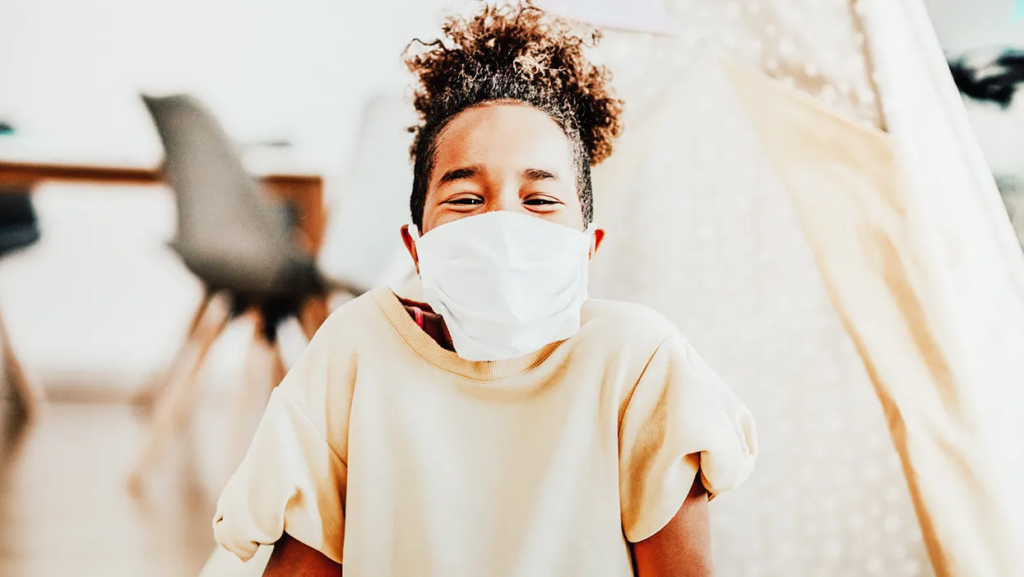Article written by Heather Marcoux | Originally published on Mother.ly on Aug 10, 2020
What doctors and parents say about the psychological benefits of masks
So many familiar, comforting things have changed in the last few months and now we’re asking our kids to do something else outside of their comfort zone: wear a mask. It might seem like added stressor but experts say there is a surprising, positive benefit to kids adjusting to this precaution.
Wearing masks helps kids feel more in control during a time when everything seems a bit out of control.
“A significant benefit of wearing any kind of mask in public is psychological,” Dr. Allan S. Detsky and Dr. Isaac Bogoch of the University of Toronto’s Department of Medicine explain. “It gives people a sense of control over the uncontrollable.”
Dad Chris Foster agrees. His family was living in Hong Kong during the SARS outbreak in 2003. His kids were young and the outbreak turned their world upside down.
“It was scary for them, as they couldn’t really understand what was going on. One of the ways we were able to help them feel a bit more secure, and feel like they were helping the world out, was by wearing a mask,” says Foster, a former COO who is now working with School Mask Pack to get masks into classrooms and onto little faces.
Foster witnessed how masks helped his kids feel more confident and in control during the SARS outbreak and hopes other parents can use masks not only to keep kids from spreading the virus but to give their kids back some of the control the coronavirus took from us in 2020.
“It made [my kids] feel more in control of their environment, and they understood that they were helping others by not spreading germs. We positioned it as their superpower, and a way they could help the world get back to normal again,” he tells Motherly. “Now at ages 18 and 20, and living in Connecticut, they don’t think twice about wearing a mask. They understand deeply that it’s not about them, it’s about everyone else.”
Last month CDC Director Dr. Robert Redfield suggested that if everybody in the United States would wear a mask, the epidemic could be under control within 8 weeks. Right now many people still aren’t wearing masks, but wearing one could help people take back some control and end the pandemic sooner.
Masks are one part of the recipe, parents are the other
Foster’s kids benefited from living in a country where mask-wearing was normalized, and by having supportive parents who were able to explain why masks are so helpful during a pandemic. That’s why Meg Sorg, a clinical assistant professor of nursing at Purdue University, recommends parents introduce masks and model wearing them.
“If moms, dads and other loved ones wear masks whenever they come into contact with anyone outside their households, it will help ensure that the kids they care for willingly follow school rules regarding masks,” Sorg writes for The Conversation, adding that kids are great imitators and will want to do what we do.
Sorg continues: “I recommend that all parents and other guardians recognize the influence they have over their kids.”
This influence can help kids benefit from the positive psychological benefits of masks, rather than seeing masks as anxiety-inducing. Many parents are worried about the emotional impact of the pandemic on children, but experts say that loving parenting will protect kids from any potential lasting negative effects.
According to Dr. Mary Margaret Gleason, a child and adolescent psychiatrist who is vice chief of the mental health program at Children’s Hospital of The King’s Daughters in Virginia, it is important to note that most children who have supportive parents in their lives will not develop anxiety or depression because of the coronavirus pandemic of 2020.
“For most, the memory of COVID-19 will shape their world view in the same way that the Great Depression shaped how many of our grandparents and great-grandparents lived,” Gleason explains, adding that while kids will remember things like how mom and dad stocked up on toilet paper, or how they had to wear a mask in school, “it won’t interfere with their development or their long-term relationships.”
She continues: “Knowing that they have someone they can count on for protection and comfort, and who will help keep life predictable, offers a powerful protection against the pandemic’s harmful effects.”
With love and masks, we can get through this.
Editor’s note: Kids with certain disabilities or sensory issues may not be able to wear masks. That’s why kids who are able to wear masks should.


